Reviews
November 1, 2012
Version française...
Flash version here.
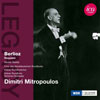 Berlioz: Requiem Op. 5 Berlioz: Requiem Op. 5
Nicolai Gedda, tenor/Cologne Radio Symphony Orchestra and Chorus/Dimitri
ICA Classics ICAC 5075 (82 m 22 s)

When Dimitri Mitropoulos died in 1960 – while rehearsing Mahler’s third symphony –his directorship of the New York Philharmonic, just recently completed, had not been successful and his commercial recordings were limited in both quantity and quality. But live performances keep popping up that confirm what a small number of admirers already knew: he was one of the greatest conductors of his generation both in the concert hall and in the opera house. This new CD adds to the legend.
Devoted to Berlioz’s Requiem, a major work that Mitropoulos never recorded commercially, the performance is meticulously prepared, deeply affecting in the quieter moments and overwhelming in the great climaxes. The effect of the four brass groups positioned around the hall in the Dies Irae can hardly be captured on a recording but this one comes close. This is the sound of brass players bursting blood vessels to give Mitropoulos what he wanted, and I am sure he must have been pleased. The young Nicolai Gedda is a huge plus in the Sanctus, although even he struggles with the awkward tessitura. Paul E. Robinson
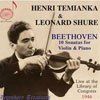 Beethoven: Sonatas for Violin
and Piano (complete) Beethoven: Sonatas for Violin
and Piano (complete)
Henri Temianka, violin/Leonard Shure, piano
DOREMI DHR-8011-3 (206 m +)

Many fine artists have recorded these works but very few come close to the mastery displayed in these live performances given at the Library of Congress in 1946. Teminaka (1906-1992) was born in Scotland of Polish-Jewish parents. He studied with Carl Flesch at Curtis and lived most of his life in the United States. Among his other achievements, he had the distinction of winning Third Prize at the Wieniawski Competition in 1935. Not so bad when you consider that Ginette Neveu came first and David Oistrakh second!
Temianka plays with a beauty of tone that has to be heard to be believed. And yet he never exploits this glorious sound for its own sake. It is coupled with exemplary phrasing and nearly ideal tempo choices. His partner is the extraordinarily gifted American pianist Leonard Shure (1910-1995). At one time Shure was Artur Schnabel’s assistant.
All the performances are fresh and surprisingly well-recorded considering the period and the fact that they are live performances. The performance of the “Kreutzer” sonata is undoubtedly one of the finest I have ever heard. And listening to these sonatas in chronological order, I was struck again by the originality of this monumental work. Paul E. Robinson
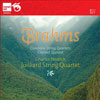 Brahms: Complete String Quartets;
Quintet for Clarinet and Strings Brahms: Complete String Quartets;
Quintet for Clarinet and Strings
Juilliard String Quartet (Robert Mann, Joel Smirnoff, violins; Samuel Rhodes, viola; Joel Krosnick, cello), Charles Neidich, clarinet
Newton Classics 8802131 (2 CDs: 71 min 55 s and 76 min 47 s)

The young, Dutch-based recording label Newton Classics is dedicated to reprocessing catalogue recordings that have been lost, for one reason or another. The Juilliards’ performance of Brahms’s string quartets, undertaken between 1993 and 1994, did not make its mark. It would seem that at the time, the American ensemble, founded in 1946, and which had already undergone several transformations, was no longer at its peak. The structural rigour that had established its reputation had been replaced by a somewhat routine, although impeccable, professionalism. And these works by Brahms, in which balance is so difficult to achieve, are affected. The necessary play of light and shadow eludes the Juilliard musicians, and the particular intensity of the first two Quartets is never met. The Third Quartet seems to gather some energy under their bows. Although Niedich is not the ideal interpreter either for the Quintet for Clarinet and Strings, the second movement does achieve some emotion. Alexandre Lazaridès
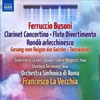 Busoni: Clarinet Concertino; Divertimento for Flute and small orchestra; Tanzwalzer op.53; Eine Lustspielouvertüre; Gesang vom Reigen der Geister; Rondo arlecchinesco op.46 Busoni: Clarinet Concertino; Divertimento for Flute and small orchestra; Tanzwalzer op.53; Eine Lustspielouvertüre; Gesang vom Reigen der Geister; Rondo arlecchinesco op.46
Giammarco Casani, clarinet; Laura Minguzzi, flute; Gianluca Terranova, tenor; Orchestra Sinfonica di Roma/Francesco La Vecchia
Naxos 8.572922 (60 min 38 s)

When we think about Ferruccio Busoni, our mind jumps almost straightaway to a dense, contrapuntal sound. The generous amount of works on this record occasionally attests to the composer’s signature sound, but will likely surprise the musical connoisseur with its light, vivacious sound, differing from what would normally be expected from a program dedicated to the Italian composer deceased in 1924. The Comedy Overture (Eine Lustspielouvertüre) is very Mozartian, the Tanzwalzer, almost Danubian, and the Rondo arlecchinesco, modernist with a hint of mischief. The typically more dense and serious Busconi is easily recognized in the Gesang vom Reigen der Geister (Song of the Spirit Dance). The Clarinet Concertino is highly suggestive, occasionally expanding the tonal framework but remaining anchored in a very pictorial conceptualization, making for a pleasant discovery. The Divertimento for Flute exhibits similar characteristics, its style ranging from late romanticism to melancholic modernism. An excellent record. Frédéric Cardin
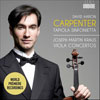 Kraus: Viola Concertos Kraus: Viola Concertos
David Aaron Carpenter, viola; Riita Pesola, cello; Tapiola Sinfonietta
Ondine ODE 1193-2 (61 min 51 s)

Joseph Martin Kraus came within a year of being Mozart’s exact contemporary (born the same year, he died less than a year later). He had a clear flair for catchy melodies and, despite not having the same spark of genius as the Austrian, developing his ideas engagingly and effectively. Kraus’s main letdown was being hired at the court of the King of Sweden, as Stockholm was far from being the hub of artistic activity at the time. Kraus’s great talent, now being increasingly rediscovered, was unable to compensate for his lack of recognition, mostly due to the relative artistic obscurity and the inconvenient geographical location of his employer. Regardless, we are fortunate that today, passionate musicians have dared to unearth these hidden treasures. Kraus’s viola concertos are well within the standards set by the work of his contemporaries and make for an important addition to the instrument’s limited repertoire. Memorable melodies and cheerful rhythms blend with a captivating and convincing interpretation from the young David Aaron Carpenter and the Tapiola Sinfonietta. Another fine discovery to add to your collection. Frédéric Cardin
DVD
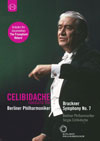 Bruckner: Symphony No. 7/Documentary “The Triumphant Return” Bruckner: Symphony No. 7/Documentary “The Triumphant Return”
Berlin Philharmonic/Sergiu Celibidache
Recorded live in the Schauspielhaus, Berlin 31 March and 1 April, 1992
Euroarts DVD 2011408 (90 m: concert; 54 m: documentary)

There are music fans for whom the name ‘Celibidache’ represents the epitome of great conducting. I must admit that when I saw him conduct for the first time in 1969 I too was amazed at his charisma and extraordinary power over an orchestra. But as the years have gone by my judgement has changed, and not for the better. Exhibits A and B, the concert and the documentary included on this new CD set, are now all I need to make my case that Celibidache has become a sad example of the overrated, all-knowing, and all-powerful maestros of his generation.
The documentary is almost totally comprised of excerpts from rehearsals for the 1992 concerts with the Berlin Philharmonic, Celibidache’s first concerts with this orchestra in 38 years. But Celibidache treats these players in one of the world’s finest orchestras as if they were students, and not very good ones at that. Was that his way of saying to them that everything they learned under Karajan was wrong and had to be unlearned? Could be, since it was Karajan who short-circuited Celibidache’s career when it was just getting started. Celibidache was the orchestra’s conductor for a few years after World War II when no one else was available. When Germany opened up again Furtwängler was restored to his former post, and after his death in 1954 Karajan was appointed for life. Exit Celibidache to a strange and marginal career based on endless rehearsals, interminable lecturing and very ordinary results.
But back to the rehearsal. Celibidache talks endlessly and finds fault in virtually every bar. He even tells the players that he is the only one who has understood Bruckner’s Seventh Symphony since Furtwängler. Off the top of my head I can think of several leading conductors who conducted the Bruckner Seventh with the BPO between 1954 and 1992, among them Karajan, Böhm, Jochum, Wand, Barbirolli and Giulini. Presumably, they were all seriously misinformed by Celibidache’s standards. And do Celibidache’s remarks to the orchestra indicate a superior mind at work? On the contrary, what he has to say is little more than arrogant nonsense.
The performance itself is outstanding for the quality of the playing. But then one expects no less from the Berlin Philharmonic. Unfortunately, the tempos are so slow that the music threatens to grind to a halt time and again. The first movement is marked “Allegro moderato” and the scherzo “Sehr schnell” but Celibidache in his wisdom chooses to totally ignore both tempo markings. In short, this performance is a travesty and could set Bruckner appreciation back by several decades. Paul E. Robinson
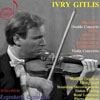 Ivry Gitlis: Volume 1. Live Performances 1955-1992. Sibelius: Violin Concerto; Brahms: Double Concerto; Paganini: Violin Concerto No. 2; Hindemith Violin Concerto, etc. Ivry Gitlis: Volume 1. Live Performances 1955-1992. Sibelius: Violin Concerto; Brahms: Double Concerto; Paganini: Violin Concerto No. 2; Hindemith Violin Concerto, etc.
Ivry Gitlis, violin, with various orchestras and accompanists
DOREMI DHR-7981-3 2CDs and a DVD (180m+)

Ivry Gitlis recently celebrated his 90th birthday and so remains one of the greatest living violinists. He was born in Israel, studied in France and quickly made a reputation as a young artist of exceptional technical ability. But in addition to the virtuosity Gitlis also became known for the passion of his playing and the originality of his interpretations.
This set is an invaluable collection that should be in any serious music lover’s library. The Sibelius concerto performance is from his U.S. debut tour in 1955 and it is sensational. Conductor George Szell has his hands full trying to catch Gitlis’ tempi, especially in the last movement, but the performance is compelling from beginning to end. In the same class is a 1966 performance with Sixten Ehrling conducting the underrated Hindemith Violin Concerto.
Some of the performances on the DVD are out of sync but nevertheless well worth watching. One cannot help but watch in disbelief as Gitlis tosses off the most difficult passages without turning a hair. Gitlis wowed audiences all over the world but he did it with his playing and not with histrionics. Paul E. Robinson
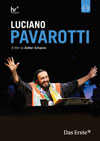 Luciano Pavarotti Luciano Pavarotti
A film by Esther Schapira
Euroarts 2058918 (58 min + bonus 35 min)

At the risk of creating hyperbole, there is Pavarotti, and there are the others. No tenor in the last 50 years had a personality as big as his, nor the sunny Mediterranean vocal inflection that made his voice so recognizable. It matters not that he couldn’t read music, that he wasn’t the paragon of the art and that he had a limited repertoire: the public loved him regardless. To complement the current Pavarotti documentation, Euroarts has released a new German documentary on the man himself. From his early years to his premature death from pancreatic cancer in 2007, everything is told candidly and sensitively throughout the documentary. It features many interviews with his wife Adua Veroni, his childhood friend Luciano Ghelfi, his personal assistant Edwin Tinoco, his colleagues Mirella Freni and José Carreras, his agent Herbert Breslin, the Met general manager Joseph Volpe, orchestra conductor and mentor Leone Magiera and even with the celebrity Bono, who admired the tenor. The only obvious absence is Pavarotti’s second wife Nicoletta Mantovani, who could not appear due to the conditions that his first wife Adua had imposed in order to herself take part in the documentary. The film illustrates Pavarotti’s essence, cheerful disposition, generous spirit and love of life (and of food) well, without forgetting his appreciation for feminine beauty. There is gossip, but it is respectful and without malice. Unfortunately short, the film’s 58 minutes are gone in a flash. The extras include further interviews with Bono, Carreras, Breslin and Volpe. A must-see for all who are intrigued by the charismatic Pavarotti. Joseph K. So
Translation: Catherine Hine
Version française... |
|


